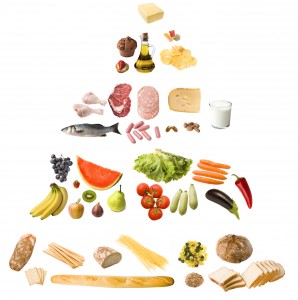
Your average breakfast may consist of a cup of fruit, a few eggs and a glass of milk, but to make it on the BYU football team, you would need triple that and then some.
BYU football players aren’t average students when it comes to eating habits. They follow carefully planned diets in order to get through hours of practice, weight training and games.
The recommended daily caloric intake for the team ranges from 3,000 to 6,000 calories, depending on the type of player. A linebacker diet plan consists of six cups of fruit, seven cups of vegetables, 21 ounces of grains, 19 ounces of protein, 12 1/2 cups of dairy, 15 teaspoons of healthy oils and 300 extra calories of whatever they want, totaling a whopping 5,000 calories. All in a single day.
Fueling an athlete with such a physically demanding lifestyle is no easy feat. All the players must pay special attention to their diet to ensure that their body stays at its peak performance level. The team has experienced a grueling fall camp in preparation for the 2015 season. While the camp emphasized physical training, nutrition also played an important role. BYU Sports Dietitian Rachel Higginson worked closely with the team to create a menu for each day of fall camp.
During the camp, players ate all their meals at Legends Grille and the Nutrition Center. They mostly ate halibut, salmon, chicken, turkey, lean cuts of meat, whole grains, salad and fresh fruit. However, they aren’t restricted to only these foods.
“[In a nutrition plan] I believe all foods can fit,” Higginson said.
There is wiggle room for players to eat all kinds of food, according to Higginson. For example, during fall camp fried food is allowed on Saturday at dinner.
Both Higginson and Dan Wilcox, BYU athletics nutritionist, work with the team to create individual diet plans as well and players can make appointments to find out what works best for them. Their emphasis is for the players to pay attention to how the food makes them feel.
“I draw them up their own individualized menus so they’ll know how much of what to eat and when,” Wilcox said. “We go through each menu and make sure that they are foods that [the players] like and foods that they are going enjoy, as well as foods that are scientifically sound as far as the good macro-nutrients, good carbs, fats and proteins.”
Before practice they focus on consuming carbohydrates and after practice the focus is protein. The most important thing for the players to remember is that, as athletes, they are in a constant cycle of fueling and refueling, Higginson said. To help with this, the nutrition center has milk, protein drinks, protein bars, fruit, nuts and many other options available to the athletes.
“Because of the sheer amount of activity that football demands from the athletes, getting all the right nutrients is essential,” local personal trainer William McQueary said.
The nutritionists’ goal is to help the players to build and maintain good habits for a healthy foundation. They want the athletes to be able to establish a healthy lifestyle that they can take with them beyond their time playing football.
“We’re really working to create a good culture here of nutrition as well as good, lean bodies. It’s been absolutely amazing to be a part of it,” Wilcox said.




